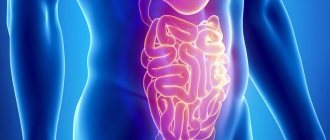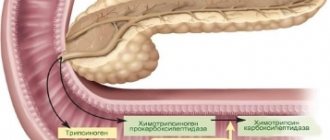What is diarrhea?
The medical term “diarrhea” is a condition where bowel movements occur too often. With normal nutrition and sufficient water consumption, bowel movements occur 1-2 times a day. If the number of trips to the toilet increases, diarrhea may be suspected.
The second determining factor is the consistency of the stool. Normal human excrement is quite hard and cylindrical in shape, but with diarrhea it changes to a mushy, semi-liquid, watery mass. Mothers mistake diarrhea during breastfeeding for an illness, but this is only a sign of it.
Preventing diarrhea while breastfeeding
It is easier to prevent any illness than to treat it. In most cases, diarrhea can be avoided by following these guidelines:
- maintain personal hygiene and keep your hands clean;
- check the expiration date of products in the store before purchasing and at home when starting to cook;
- process meat and eggs carefully so that bacteria do not enter the body due to insufficient cooking or stewing;
- eat according to the breastfeeding diet;
- Try to constantly be in an excellent mood and, if possible, avoid stressful situations.
Thorough washing of vegetables and fruits along with personal hygiene reduces the risk of intestinal infections
Symptoms of diarrhea in a nursing mother
The illness occurs in different ways, but the general symptoms are the same:
- weak, lethargic state;
- abdominal cramps;
- dyspepsia;
- temperature increase;
- nausea.
Diarrhea and vomiting in a mother while breastfeeding are a serious reason to start treatment. Dehydration due to diarrhea occurs very quickly, which provokes serious complications - microelements are also excreted in the stool.
Important! If there are mucous impurities or blood in liquid stool, then urgent hospitalization is necessary. If the excrement turns black, an ambulance is called, since the symptoms indicate bleeding in the intestines.
Symptoms of diarrhea during lactation
A single loose stool is not a cause for alarm. Causes for concern are frequent bowel movements, fever, vomiting, and a feeling of nausea. Additional symptoms of diarrhea in a nursing mother include:
- headache;
- rumbling in the stomach;
- increased drowsiness;
- feeling of constant fatigue.
Dangerous manifestations require immediate medical attention. These include high fever, mucus in the feces and green streaks, black feces, fainting, loose stools more than 5 times a day, severe abdominal pain.
Causes of diarrhea
One of the harmless factors that provoke diarrhea during breastfeeding is the woman’s excessive anxiety. Inexperience gives rise to a lot of fears, and diarrhea begins against the background of stress. To restore emotional balance, you will need to consult a doctor who will prescribe medicinal teas or sedatives.
Taking a number of medications can lead to temporary stomach upset, so it is better not to self-medicate. Even when prescribing antibiotic therapy, the therapist will supplement the regimen with maintenance drugs that contain lactobacilli and bifidobacteria.
Diarrhea often occurs due to irritable bowel syndrome (IBS), with different clinical presentations:
- The intestinal mucosa is not affected by pathogens, so the temperature remains normal.
- Indigestion alternates with constipation. There is a false urge to go to the toilet or a feeling of incomplete bowel movement.
- When a nursing mother has diarrhea, her stomach hurts in the lower part, like before her period.
- Bloating and flatulence disappear after bowel movement.
Doctors cite hormonal fluctuations that occur in women after childbirth as one of the reasons for the development of IBS.
Intestinal infections
Throughout the entire period of lactation, the body of a nursing mother is weakened, therefore it is easier and faster to be attacked by microbes. Pathogenic bacteria produce toxic substances - in this condition, therapy with detoxifying drugs will be required. The acute question arises whether a mother can feed her baby breast milk if she has diarrhea, due to the risk of possible infection. To protect the baby, it is necessary to wash your hands frequently with soap, since skin-to-skin contact is the only route of transmission.
Allergy
An allergic reaction is manifested by an upset stomach and skin rashes, but this cause is extremely rare during lactation. A strict diet for a mother who is breastfeeding her baby eliminates diarrhea due to food irritants. A woman can afford to make mistakes in her diet after introducing complementary foods, but she is unlikely to indulge in an obvious allergen.
Poisoning
Symptoms are characterized by fever, as well as vomiting and diarrhea in a nursing mother. The likelihood of dehydration increases, so treatment under medical supervision is necessary. Food poisoning only affects a woman's intestines, without affecting the organs that are responsible for producing breast milk.
Foods that can cause diarrhea while breastfeeding
With a strict diet or food restrictions, a nursing woman sometimes wants to treat herself to something tasty. The intestines can react violently to such experiments, so everything new and “well forgotten old” should be introduced into the diet in small portions. However, there are a number of foods that cause diarrhea during lactation:
- Fried and fatty foods. It is difficult for the stomach to cope with foods that are too heavy, so excess fat will most likely lead to diarrhea. It’s not for nothing that doctors recommend completely eliminating such foods from the diet - diarrhea will appear in mother and baby during breastfeeding, since the child’s fragile intestines will also react violently.
- Mushrooms. Hard fibers are poorly digested, and the additional load on the gastrointestinal tract can lead to indigestion not only for nursing women. A child may experience such cramps and cramps in the tummy that a couple of sleepless nights are guaranteed.
- Alcohol. Any sane woman will completely eliminate alcohol during lactation, but not everyone is able to resist the persuasion of relatives at a family celebration. “You can’t get drunk from one sip” - it’s hard to argue with this statement, but a tiny amount of alcohol is enough to cause diarrhea. The leader in the list of record holders is red wine, which is considered the safest and even healthiest drink.
- Coffee. In addition to the diuretic effect, aromatic grains have the ability to liquefy stools, especially on an empty stomach.
- Vegetables. In order not to have to look for information on how to treat diarrhea during breastfeeding in a mother, it is advisable to give up legumes, zucchini and pumpkin. Or at least reduce their consumption to a minimum, given the laxative effect on the intestines.
- Dairy products. Small portions of kefir or yogurt are normally digested in the gastrointestinal tract, but an excess of live fermented milk cultures will lead to a “mutiny on the ship.” As breastfeeding experts advise, you need to know moderation in everything.
- Whole grains and dried fruits. The fibers of the listed plant crops are practically not broken down and are excreted undigested, causing stool liquefaction.
Causes of diarrhea and treatment in mothers
Diarrhea occurs during breastfeeding if the natural process of absorption of water and electrolytes is disrupted in a woman’s intestines. Diarrhea is a condition when the volume of feces exceeds 500 g per day and they have a liquid consistency.
Dysbacteriosis
Mothers after cesarean section may suffer from dysbiosis. During the operation, an infection may enter the mother's body, which then causes diarrhea. Dysbacteriosis can be caused by medications, diet, chronic or infectious inflammation of the gastrointestinal tract.
Symptoms of dysbiosis:
- false urges;
- diarrhea alternating with constipation;
- fatigue.
The diagnosis of dysbacteriosis is made after testing.
Irritable bowel syndrome
For young mothers, life is filled with worries and worries about the baby. The occurrence of irritable bowel syndrome is not uncommon for them. It is caused by strong emotional experiences and stress.
Symptoms of irritable bowel appear during the waking period, during the day. During night sleep, the intestinal muscles relax, diarrhea does not bother you. When the woman wakes up, the problem returns.
With diarrhea caused by irritable bowel syndrome, there is no fever, no vomiting, and no blood in the stool.
Taking sedatives and muscle relaxants helps eliminate unpleasant symptoms.
Food poisoning
The quality and freshness of food should come first during breastfeeding. Bacteria that are harmful to the female body and the baby multiply in stale foods. Getting into the intestines with food, they poison it with toxins. They release these harmful substances during their life processes.
Toxins disrupt normal intestinal function and inhibit beneficial microflora. A nursing mother experiences severe diarrhea. It is accompanied by nausea, vomiting, and abdominal pain. Sometimes, due to food poisoning, a woman with breastfeeding may develop a fever.
Infection in the intestines
In nature, there are many bacteria that, when they enter the stomach, do not die under the influence of gastric juice. They actively multiply in the intestines. At the same time, toxins are released, from which the mucous membrane becomes inflamed.
Ways bacteria enter the body of a woman who is breastfeeding are poorly washed vegetables and fresh fruits, dirty hands, unsanitary conditions in the house. The most common intestinal infections:
- salmonellosis;
- dysentery;
- Escherichiosis;
- yersiniosis.
Allergy
Diarrhea, along with skin rashes, watery eyes, and sneezing, can be a symptom of an allergy. At first it manifests itself as acute pain that occurs in the abdominal area. The stool loosens a little later.
If you have allergic diarrhea, a woman should not take anti-diarrhea medications. They will only complicate the situation. To stop diarrhea, it is necessary to accelerate the removal of the allergen from the body of a nursing woman. Taking sorbents and drinking water help with this. Your doctor can recommend an antihistamine that is safe for your newborn.
Some foods if consumed in excess
It is possible to eat fresh food and suffer from diarrhea. A woman during lactation should know the list of foods that cause diarrhea. Such foods should be eaten in moderation. For example, if a woman eats fresh fruit often and in large quantities during breastfeeding, she may develop diarrhea.
The hard fibers they contain are poorly digested and increase intestinal motility. Prunes, whole grains, fermented milk products, and vegetables have a laxative effect.
With moderate consumption of these foods, diarrhea does not occur.
The danger of diarrhea for mother and baby
For a nursing mother, you need to find a remedy for diarrhea as soon as possible, since the harm is only done to her body:
- important microelements are washed out;
- the risk of dehydration increases.
It is impossible to infect a child if basic hygiene rules are observed. Intestinal infections are transmitted by the fecal-oral route - the baby will get sick if he accidentally swallows particles of contaminated excrement. Bacteria are not transmitted with milk, but the baby can receive useful antibodies that will strengthen its immunity.
Only some methods of therapy (for example, taking antibiotics) pose a danger, so treatment should be prescribed by a doctor after determining the cause of diarrhea.
Is it possible to breastfeed if you have an intestinal disorder?
Mothers often wonder whether it is possible to breastfeed a newborn with diarrhea and what consequences can be expected. Diarrhea for more than 3 days during breastfeeding leads to dehydration of the body, which means the amount of breast milk decreases.
During the fight against viruses, the mother's body produces antibodies, which are passed on to the child and strengthen his immune system. But it is prohibited to continue feeding the baby if there is pain in the abdomen, high temperature as a result of severe food poisoning or rotavirus infections entering the mother’s body.
It is necessary to consult a doctor and only after permission from a specialist to continue breastfeeding.
Is it possible to breastfeed while having diarrhea?
Is it possible to feed a baby if a nursing mother has diarrhea? This is one of the pressing issues that causes controversy with the older generation. Grandmothers are sure that any disease is transmitted to the baby, so they insist on stopping lactation. This is the most harmful advice that exists, since early weaning is fraught with negative consequences. If you wash your hands thoroughly after each visit to the toilet, your child will be completely safe.
To avoid doubts about whether it is possible to breastfeed if the mother has diarrhea, it is advisable to consult with a breastfeeding specialist in advance. Defending your own point of view during acute diarrhea is not the best option, so all controversial issues need to be discussed with relatives in advance.
Important! During an intestinal infection, the female body produces immune cells that pass through the milk to the baby, so it is even beneficial to continue feeding. It is sometimes necessary to interrupt lactation if therapy is incompatible with breastfeeding, but modern pharmacology offers many safe drugs.
Causes of diarrhea in a nursing mother
There are a number of known factors that provoke the occurrence of diarrhea in nursing mothers. After pregnancy and childbirth, the female body weakens, the immune system weakens, and as a result of changes in the young mother’s regime, constant fatigue and exacerbation of chronic diseases appear. This becomes a common cause of indigestion.
Doctors identify 6 causes of diarrhea:
- Irritable bowel syndrome. In this case, there is no vomiting or hyperthermia; diarrhea bothers the woman during the daytime. In a state of sleep, the intestines relax, and the symptoms of the disease disappear. After awakening, the pathology resumes.
- Toxic infection occurs when the rules of hygiene and sanitation are violated by a nursing mother. By eating spoiled food or using bad products, a woman leads to intestinal infection. Acute diarrhea occurs due to the ingestion of salmonella, shigella, and cocci. The disease manifests itself with diarrhea, vomiting, nausea, fever occurs, and the woman experiences weakness.
- Food allergies. Leads to stomach upset in a nursing mother. This occurs due to damage to the intestinal mucosa by allergens.
- Stress can cause indigestion. When a person is nervous, there is an increased release of adrenaline, which affects the functioning of the gastrointestinal tract (gastrointestinal tract).
- Medications. Taking a number of medications can lead to persistent dysbiosis, and diarrhea begins.
- Eating disorder. If the regime is violated, a failure occurs in the woman’s eating regimen - this leads to an exacerbation of chronic gastrointestinal diseases, a malfunction of the intestines occurs, causing diarrhea.
First aid for a nursing mother with diarrhea
You can cope with the primary signs of illness on your own at home if you take an effective absorbent:
- Smecta;
- Polysorb;
- Carbolene;
- Atoxyl;
- Lactofiltrum;
- Sorbex.
There is no clear answer to the question whether a nursing mother can use activated charcoal for diarrhea. It certainly won’t harm a woman or child, but it won’t bring much benefit. There are many modern and more effective means to eliminate diarrhea.
Additionally, you need to drink more than 2 liters of fluid to prevent dehydration. It is better to drink in small portions and small sips so as not to provoke vomiting. It is advisable to temporarily follow a gentle diet, eliminating food irritants. When the acute attack passes, you need to consult a doctor - he will identify the cause of the ailment and prescribe a course of adequate therapy.
First aid
Regardless of the cause of diarrhea in a nursing mother, treatment should begin immediately. This will be emergency first aid before seeing a doctor. The first thing a nursing mother should do after giving birth is to exclude from her diet all fatty, spicy, salty and pickled foods, as well as sweets, desserts, milk and fermented milk products. In this condition, she needs a strict diet. Then you need to start taking enterosorbents, you can use activated carbon and Enterosgel, and you need to do this right away.
It should be remembered that the main danger of diarrhea of any etiology is dehydration. Once excreted in the stool, it is significantly diluted with water from the small intestine. Therefore, it is recommended that a nursing mother try to ensure a normal drinking regime. The best solution is to use pharmaceutical rehydration solutions like Regidron etc. You can make your own using warm water, baking soda, sugar and salt. These solutions also restore the salt balance in the body and help to quickly recover from diarrhea, which needs to be treated as soon as possible.
Activated carbon is a sorbent recommended for diarrhea (after cleansing the stomach).
Food poisoning is a common cause of diarrhea in nursing mothers. The algorithm for what to do before the doctor arrives to tell you specifically how to treat diarrhea should be as follows:
- Rinse the stomach with a weak solution of manganese or plain boiled water.
- Try to ensure bed rest, leaving the baby with the family.
- Drink as much water or rehydration solution as possible (ideally at least 1.5 liters per day).
- Avoid food for 12 hours and eat only breadcrumbs and black tea to satisfy your hunger.
- Take activated charcoal or another approved sorbent while breastfeeding.
Diarrhea during breastfeeding, accompanied by nausea, vomiting, fever and other unpleasant symptoms, should consult a doctor immediately. Regardless of whether you plan to take medications that are prohibited or simply undesirable during lactation, this is strictly prohibited. They can negatively affect the child.
Treatment
The body can cope with many pathogens in a few days, but sometimes complex treatment may be necessary. Preparations with bifidobacteria will help normalize the intestinal microflora. The therapist will tell you which ones are needed in each specific case.
In case of severe dehydration, it is recommended to take Regidron, which restores the acid-base balance and prevents the excretion of electrolytes. The menu should consist of stewed and boiled foods, vegetable broths, light soups, water-based porridges, as well as fish and lean meats.
Taking medications is aimed at removing toxins, so when asked whether a nursing mother can take Loperamide for diarrhea, doctors answer in the negative. The effect of taking it comes very quickly - diarrhea stops, and the infection remains “preserved” in the intestines. This aggravates the condition and can lead to poor health.
Treatment of diarrhea during breastfeeding
The stages of action in the treatment of diarrhea during breastfeeding are prescribed by the attending doctor, taking into account the factor that provokes diarrhea and the general condition of the mother. A neutral remedy is activated carbon for breastfeeding against diarrhea or preparations based on apple pectin.
Medicines for diarrhea during breastfeeding
Medical treatment for intestinal disorders involves the use of drugs to eliminate toxins from the body. You can use Atoxil or Sorbex, and to eliminate dehydration - Regidron.
Smecta, Regidron, Polysorb, Activated carbon are some of the main means in the fight against diarrhea during breastfeeding.
Smecta powder will help not only cleanse the body of harmful elements, but also thicken stool on the first day of taking the product. Safe sorbents for lactation are Polysorb, Enterosgel, Filtrum.
During lactation, antibiotic therapy is contraindicated: Levomycetin, Tetracycline, Lincomycin. Such drugs impair the activity of the child’s bone marrow and negatively affect the growth of the baby’s bones and cartilage.
Folk remedies
Simple traditional medicine recipes will help you get rid of indigestion:
- 2 tsp. Pour ½ liter of boiling water over washed white rice and cook for at least 40 minutes over very low heat. Cool the broth, strain through a fine sieve, drink 50 ml every 3 hours.
- It is useful to drink dill water, as well as mint and lemon balm teas.
- Grind the peels of 1 pomegranate, pour 250 ml of boiling water. Infuse until the liquid turns color, then drink the decoction at a time.
- 1 tsp. oak bark, pour 300 ml of boiling water, simmer over low heat for no longer than 10 minutes. Cool the broth, strain, take 1 tbsp three times a day. l.
You can take advantage of the gifts of nature the first day after the onset of illness. If diarrhea continues for more than 3 days and the temperature does not subside, it is better to entrust your health to a therapist.
How to treat diarrhea
First of all, it is necessary to establish nutrition. Eliminate harmful foods and drinks from your diet. Eat vegetable broths and soups, boiled and stewed dishes.
The diet for diarrhea excludes spicy, fried and salty foods, dairy and fermented milk products, fresh fruits and vegetables, sweets and carbonated drinks, and oven-baked foods. You can eat porridge with water, lean boiled meat and lean fish.
On the first day of diarrhea, there is usually no appetite. However, you definitely need to eat. Vegetable broth will restore strength and maintain breast milk production.
You can use folk remedies that will not harm a nursing mother and baby:
- Oak bark decoction
An effective anti-inflammatory agent. To prepare the decoction, add one teaspoon of dry oak bark to 300 ml of hot water and leave to boil for 10 minutes. Drink the cooled and strained broth one tablespoon three times a day.
- Congee
The enveloping substances in the decoction will protect the intestines from gastric acid and relieve irritation. To prepare the product, add two teaspoons of washed, polished rice to 500 ml of boiling water. Cook the mixture for 40 minutes over low heat. Cool the broth and strain through cheesecloth.
Drink a quarter glass throughout the day at intervals of two to three hours. Within an hour after administration, the product improves digestion!
- Pomegranate peels
Few people know that pomegranate peels are no less beneficial than pomegranate juice. Antibacterial substances in the peel kill germs that cause diarrhea.
Peel the pomegranate and remove the white pulp from the skin. Grind the peels and pour a glass of boiling water. Infuse the decoction until the water turns color. Drink the whole glass. Within 10 minutes the condition will improve.
- Bird cherry berries
Can be used for intestinal infections. Pour a tablespoon of ripe fresh berries with a glass of boiling water and leave for half an hour. Drink half a glass of the strained broth two to three times a day.
To stop fluid loss, drink more. If you have diarrhea, drink at least three liters of water (whereas a normal person needs two liters). Drink boiled or filtered water, still mineral water, broths and black tea without sugar.
Prevention
To prevent the occurrence of diarrhea, it is enough to follow the recommendations:
- Observe proper storage of food, especially in the warm season.
- Do not buy food at “spontaneous” markets, even if you “always bought from this sweet grandmother.”
- It is better to throw away spoiled food without endangering your health - food poisoning can unsettle you for a long time.
- Wash your hands thoroughly when preparing food, before eating, after visiting the toilet, and upon returning from outside.
- Do not drink water from questionable sources.
- Avoid strong emotional experiences and stressful situations.
- Eat a balanced diet.
Diarrhea may indicate more than just a temporary digestive disorder. Often it is a signal of a serious illness, so dangerous symptoms cannot be ignored. During the period of illness, it is advisable for a woman to lower her demands on herself and not put all the worries about the baby on her own shoulders. You can ask close relatives for help, while maintaining strength for recovery.
Diarrhea due to poor diet
If a nursing mother has food poisoning, the first step is to identify the food that caused the diarrhea. Next, cleanse the body of waste and toxins using safe sorbents and adjust the diet.
On the first day, drinking plenty of fluids, bed rest if possible, and minimal food consumption are recommended. Eating dried bread and crackers will relieve pangs of hunger and stop diarrhea.
Taking probiotics and prebiotics to normalize the activity of microflora will speed up treatment. You can breastfeed your baby if there are no signs of intoxication.
Review of approved anti-diarrhea drugs
Before starting treatment for diarrhea, it is necessary to understand the cause of the unpleasant symptom. After passing all the tests, the doctor determines further tactics.
Therapy always starts with proper nutrition. The diet includes the following foods and dishes:
- It is recommended to drink 1.5-2 liters of ordinary water per day;
- low-fat soup with vegetables, seafood;
- porridge with buckwheat, rice, oatmeal with a small chicken leg;
- Dried fruit compote is a healthy drink. Replenishes fluids and vitamins;
- baked apples, steamed vegetables.
It is better not to consume purchased vegetables and fruits. A nursing woman will wear them for a long time.
The second step to recovery is taking medications. Popular and effective medications for diarrhea include:
- Linex belongs to the group of eubiotics. The drug replenishes the reserves of intestinal microflora. Consists of live lyophilized lactic acid microorganisms: bifidobacteria, enterococci. The latter cause a shift in intestinal pH to the acidic side, which inhibits the growth of pathogenic bacteria. Beneficial microorganisms affect digestive enzymes, bile secretion, and increase local immunity. Linex is safe for use during pregnancy and lactation. Pregnant women are prescribed 1 capsule 3 times a day.
- Smecta is a natural enterosorbent. Mechanism of action: the drug forms polyvalent bonds with intestinal mucus. The drug enters the intestines and actively collects toxins and foreign organisms. Smecta is displayed unchanged. Take 3 sachets per day.
- Kaopectate consists of magnesium and aluminum silicate. The drug enters the intestines, binds pathogenic microorganisms and their metabolic products. The medicine creates a thin protective film on the intestinal mucosa, thus reducing the irritating effect of toxins. Kaopectate is excreted unchanged. Available in suspension and tablets. Take 2 tablets or 2 tablespoons of suspension after each bowel disorder (maximum dose - 12 tablets).
- Nifuroxazide is an intestinal antiseptic. Destroys gram-positive bacteria (common pathogens of intestinal infections). It has a bacteriostatic, bacteriological effect. The maximum course of treatment is 7 days. Improvement occurs after the first dose of the drug. Prescribed 1 tablet 3 times a day.
If diarrhea is a symptom of an intestinal infection, you cannot do without taking antibacterial drugs. Safe antimicrobial agents include:
- penicillins (amoxicillin, ampicillin);
- cephalosporins are approved for use in pregnant women from the second trimester;
- macrolides (azithromycin).
Traditional medicine helps solve the problem safely. There are many recipes for diarrhea. The products will not have a toxic effect on the baby's health. Popular traditional methods of treating diarrhea include:
- Take 1 tsp of starch, dilute in half a glass of water. Take the medication no more than 2 times a day.
- Lingonberry or cranberry jelly reduces irritation of the intestinal mucosa and increases the body's protective properties.
- Pour 1 tbsp of pomegranate peel with a glass of boiling water. Leave for 30 minutes. Drink throughout the day.
Preventive actions
A nursing mother needs to take preventive measures in advance against the occurrence of stomach disorders, rather than treating diarrhea and worrying about the baby. If infectious intestinal diseases have been previously noticed, doctors advise adhering to special rules. Preventive measures include:
- proper storage of products;
- eating only fresh food;
- maintaining personal hygiene;
- washing fruits and vegetables, even if you are not sure of their cleanliness;
- avoiding large crowds of people during outbreaks of infectious diseases.
Digestive disorders and diarrhea during lactation are not only allergic reactions to foods, but are also a manifestation of a serious pathology. A young mother needs to know that with a bacterial disease, the infection is transmitted to the baby through milk. Therefore, any additional sign is considered a signal to visit a doctor to diagnose your body. If preventive measures are followed, the occurrence of diarrhea will be significantly reduced.
Young mothers often face the problem of loose stools due to various factors. Therefore, in order to get rid of an unpleasant symptom, they begin to self-medicate. For any manifestation of diarrhea, you should consult a qualified doctor. This will reduce the risk of spreading the disease to the child. In some cases, it prevents undesirable consequences for the mother’s body.
We recommend: Why does a child have white diarrhea?










